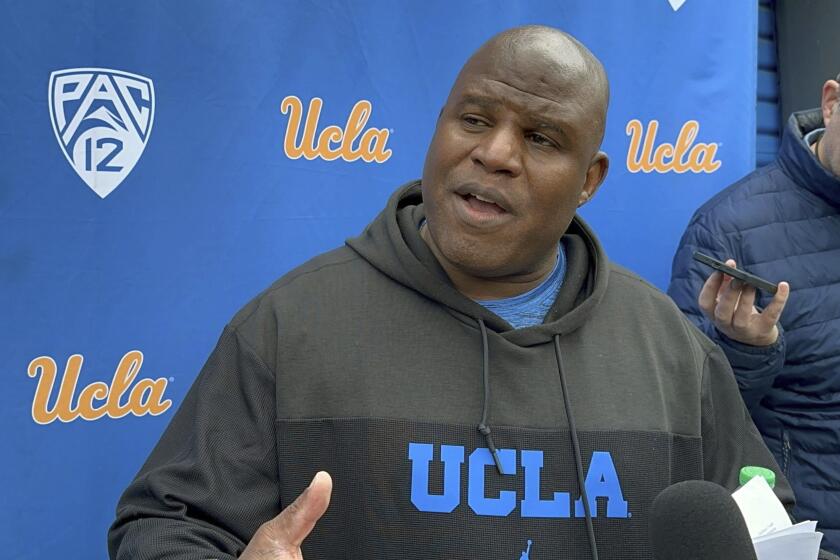A PIONEER IN BOWLING : Branham Finds Fame--and Fortune--to Be Right Down His Alley
George Branham III touched off a small controversy in the Professional Bowlers Assn. last November when he won the Brunswick Memorial World Open at Glendale Heights, Ill.
The PBA proclaimed him to be its first black champion. Two weeks later, in a tournament at Taylor, Mich., the PBA tried to arrange a meeting between Branham and Detroit Mayor Coleman Young, who is also black. Writers from Jet and Ebony magazines were sent out to do profiles on Branham.
Meanwhile, Willie Willis stewed.
Willis, who won the national Resident Pro tournament in 1979, believes that he should be recognized as the PBA’s first black champion. His victory earned him a berth in the 1980 Firestone Tournament of Champions, where he finished 13th. He is still the only black to have competed in the prestigious event.
“I’ve been slighted,” Willis said Tuesday at the Gable House Bowl in Torrance, where he and Branham are among the 160 pros competing this week in the $125,000 Greater Los Angeles Open. “I’m very bitter about it. They’ve taken away my legacy.”
But the PBA, by way of explanation, says that the Resident Pro is not a tour event. In fact, it is not even open to touring pros. Branham, then, is the first black to win a tour event.
Still, Willis said: “I think it’s stupid if you ask me.”
Unwittingly thrown into the middle of all this is Branham, who said: “I’m just out here to make money and be a good bowler.”
Whether he likes it or not, though, Branham, 24, is looked upon by some as kind of a pioneer.
“I think the attention he is getting in the media certainly will catch the attention of black athletes and perhaps encourage them to take a closer look at bowling as a possible career,” PBA Commissioner Joe Antenora said by phone Wednesday from the PBA offices in Akron, Ohio. “I certainly think it will have a positive effect.”
A black bowler, J. Wilbert Sims, appeared on the PBA’s first telecast in 1962, but only a few blacks have joined the tour since its inception in 1959. The most notable have been Charlie Venable, who had two top-five finishes in 1977 and 1978; Bobby Williams, who was second at Fresno in 1973; the late Harry Johnson, who was second at Green Bay, Wis., in 1968, and Willis.
Before last year, Willis was believed to have won more money in one year than any other black bowler. He won $20,759 in 1980, when he finished fifth twice.
And then came Branham, who is one of only three blacks among the 125 or so bowlers considered full-time touring pros.
Branham’s family moved from Detroit to the San Fernando Valley in 1978. He was a basketball player at Poly High in Sun Valley and a sure-handed receiver, too, in junior high. His father said he was approached about enrolling at Granada Hills High to catch passes from John Elway, but that his request to transfer was denied by the school district. At Poly, he stuck to basketball.
But he was 5-10, as he is now, and when he realized that a college basketball scholarship would not be forthcoming, he got serious about bowling.
His father, George Branham II, was a member of the old Negro Bowling Assn. and still maintains a 196 average. George III was introduced to the sport at age 6.
He entered his first tournament at 15, but missed the cut. He threw a fit and his father threatened to put his shoes and bowling balls into a closet until he learned to control himself.
“When you get into that state of mind, the game will just beat you to death,” George II said.
So George III worked on his temper. He won the Tournament of Non-Champions, part of the Junior Amateur tour, in 1983. The following week, he won the Tournament of Champions and was named junior bowler of the year by the Southern California Bowling Writers Assn.
He turned professional in 1984, then joined the PBA tour in 1985, when he won $23,640 and was runner-up to Tom Crites in voting for rookie of the year.
He won two regional tournaments, but his highest previous finish in a national tournament was eighth before he reached the five-man television finals at the Brunswick Memorial World Open last November. In the final game, he beat Mark Roth, the tour’s No. 2 all-time winner with 32 titles.
Sudden fame, such as it is in the PBA, soon followed.
“I didn’t expect it to be built up so big,” he said. “I figured I might get a few lines in Ebony because I was black. I didn’t think they’d write a big story about me.”
Sometimes, he said, he feels like a role model and that he’s being watched.
Mostly, though, he thinks about improving his game.
Of the victory over Roth, he said: “That gave me a lot of confidence. I mean, I had confidence, but I still had doubts about my ability to make it out here.”
The victory also allowed him to relax, he said, because it was accompanied by a check for $33,260, more than doubling his yearly earnings, which reached $59,620 by the end of the year.
Two weeks ago, he won again, earning $27,000 at the AC-Delco tournament in Union City, Calif.
In TV appearances, he is 7-0 with a 233 average. His overall average this year is 211.
“I think it’s because I know the cameras are there and everybody’s watching,” he said of his higher average under the bright lights. “I block everything out and concentrate on what I’m doing. I’m just out there to bowl.”
And not to make any statements about his race.
“We never looked at it in that sense,” said his father. “At least this is the way I put it to him: You’re a bowler. You’re a professional. And this is all that counts. We’re glad we did it, and it’s nice we did it for the race. We have no problems with that. But we’re not saying we’re a role model for the black race.
“I never taught my kids in the role of races. They’re just competitive kids in sports.”
Meanwhile, Willis said he is very proud of Branham.
“To venture into new lands takes pioneers,” he said.
Branham said he feels for Willis. “It’s like they’re pushing everything in the past away, putting it down,” he said. “I don’t think that’s right. I don’t think they should do that.”
For now, though, he’s got other things on his mind. He’ll be married in August to Patty Cummings of San Diego, so mostly he thinks about earning a paycheck.
“To me, cashing (finishing in the money) every week would be fine,” he said. “And then to make the finals every now and then would be great.”
Winning a few more times, of course, would be even greater.
More to Read
Go beyond the scoreboard
Get the latest on L.A.'s teams in the daily Sports Report newsletter.
You may occasionally receive promotional content from the Los Angeles Times.










